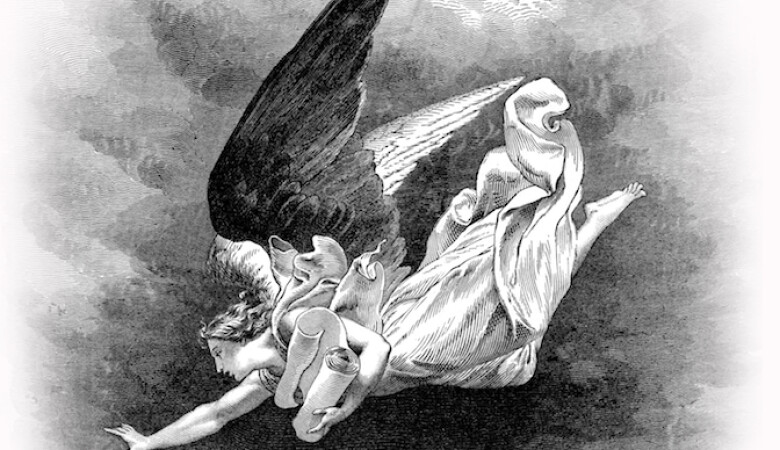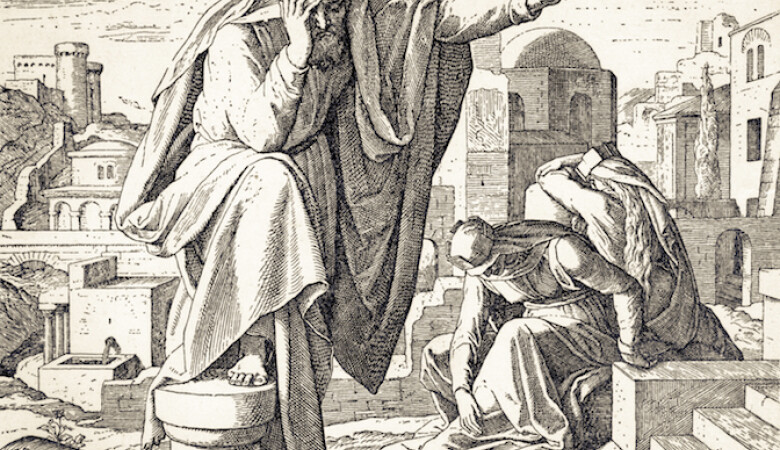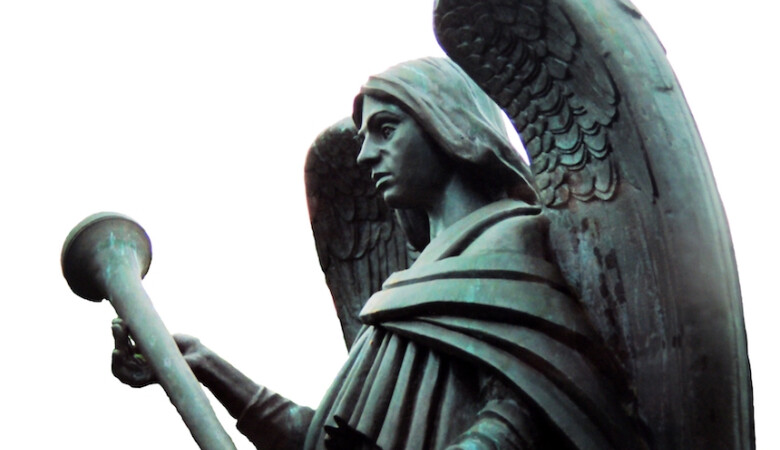Lessons on the End of the World, Part II (Revelation Sermon 23 of 49)
October 15, 2017 | Andy Davis
Revelation 12:1-13:18
The Doctrine of Scripture, Prophecy
Introduction
Scripture divides into two great categories — milk and meat. Milk is the simple doctrine of the Bible, the center piece of which is the Gospel of Jesus Christ. The milk of the Gospel can be organized into four main categories: God, man, Christ, response. We share this with unbelievers. Workers all over the world have gone abroad to try to explain in culturally understandable ways.
First, there is a God who made Heaven and earth, and therefore He has the right to rule as king over everything that He made. As our Ruler, He has given us laws by which we are to live. Those laws are very clear and simple, organized broadly into the Ten Commandments: “You shall have no other gods beside me. You shall not make any idols. You shall not take the name of the Lord your God in vain. Remember the Sabbath by keeping it holy; do all your work in six days and rest on the seventh, for God made heaven and earth in six days and rested on the seventh. Honor your father and mother. You shall not murder. You shall not commit adultery. You shall not steal. You shall not bear false witness against your neighbor. You shall not covet anything that belongs to your neighbor.”
Jesus taught that though we may not have committed murder physically, if we have murderous hearts we are in danger of the fire of hell. We may not have committed physical adultery, but if we have adulterous hearts, looking at one who is not our spouse lustfully, we are in danger of the fire of hell.
He probed the inner workings of the heart, and then organized all of the law in two great commandments: the first and greatest is to “‘Love the Lord your God with all your heart and with all your soul and with all your mind and with all your strength.’ The second is this: ‘Love your neighbor as yourself.’” We do not keep these Commandments; we break them every day. It is grace from God to know the truth of that.
The second great category is man, or the human race. We were created in the image of God to have a relationship with Him, to love and serve and walk with Him, but we fell into sin in Adam, our first father, who ate from the tree of the knowledge of good and evil. In him the entire human race fell. We were given a sin nature. When we were able to understand the law, we broke it — we violated the Ten Commandments and the two Commandments; we are all sinners and fall short of the glory of God. As a result, we are threatened with eternal death and hell. We can not save ourselves; we need a Savior.
The third category is Christ. God sent his Son into the world, born of the virgin Mary; he lived every single day of his life sinless under the law of God. He obeyed every jot and tittle, every detail perfectly. No one but Jesus has fulfilled the two great Commandments. He loved God with all of his heart; he said, “I always do what pleases him.” Always. And He loved his neighbors as himself, especially by going to the cross for us. Though he had committed no sin and there was no deceit in his mouth, he went to the cross and stood under the fiery wrath of God, who is a consuming fire. He was condemned for us: “God made him who had no sin to be sin for us, so that in him, we might become the righteousness of God.” He offers the free gift of righteousness and full forgiveness of all sins to us.
We are able to access that by repentance (turning from our sins) and faith (trusting in Christ). All of our sins can be forgiven. You may know that you have not crossed over from death to life, that you are not a Christian. You have just heard the Gospel, which is milk — that which a child can understand. If you look to the law and know that you are guilty, that you have sinned, and then look to Christ crucified and resurrected with the eyes of your heart, you will see your Savior. You do not have to move a muscle; if you will trust in Jesus, all of your sins will be forgiven. If you genuinely do that, a whole river of righteous acts will start flowing — a commitment to walk in newness of life.
Meat is the harder stuff in the word to understand. Peter said about Paul’s writings in 2 Peter 3:16 that he writes some things “that are hard to understand.” (Ironically, some of the hardest statements in the New Testament are written by Peter.) These are beneficial truths — God wants us to know them, but we need spiritual teeth to chew them and it takes a while to understand. Eschatology, or end time teaching, is meat. Here are six reasons why it is hard to understand.
First, eschatology is hard to understand because God intends it to be hard to understand. It is not an accident. We do not demand that he learn to make it simpler. He intends to speak to us in language difficult to understand. He wants only believers to get it. He could have written out an exact chronology with names and dates. Daniel 11 is a most astonishing chapter, displaying God’s ability in detail to predict the future. There are 106 uses of the helping verb “will” in the NIV (1984 version), indicating future events. God is showing off. He can give meticulous details about future events. But he did not intend to do that. Instead, he speaks in such a way that only believers will be able to understand, and not all believers equally, but those who need to understand the most will.
Second, God has spoken end-time teaching to us in apocalyptic, prophetic, visionary language that is not easy to understand. He uses symbolism — beasts and horns and oceans and winds It is not immediately clear. It needs interpretation, similar to a parable.
Third, he has scattered the salient points and Scriptures in different places, such as Matthew 24, 1 John 2, Daniel 7, and Revelation. It requires the work of theologians to put things together.
Fourth, the issue of type and fulfillment is a problem. History is filled with events that act out a type of fulfillment of various prophecies that are dress rehearsals of the final. Many people want to stop there, as though they are the final fulfillment. The destruction of Jerusalem in 70 AD was clearly not the end — almost 20 centuries of history have occurred since then. But many godly commentators will claim that Matthew 24 is talking about the prophetic destruction of Jerusalem. As Jesus said, “As it was in the days of Noah, so it will be at the coming of the Son of Man,” we see many prophecies that are acted out in small ways, like dress rehearsals,. Hitler was a dress rehearsal, a type of antichrist, very tragic and difficult, but he died in the bunker and history has continued since his time. He was an antichrist, but not the one final Antichrist.
Fifth, we have a story with complex chronology. It is hard to follow, not easy to understand.
Sixth, current events and exegesis of Scriptures must be married, lined up simultaneously. Many generations have sought to line these things up, but because of so many misfires and predictions that didn't come true, some would discard the whole thing.
We are looking at the big picture of eschatology to help bring context to our study of Revelation. Christianity is a unique religion in the world and this is apologetic material. When you are talking to Muslims, atheists, or Buddhists, this is a weapon of truth you can use. Christianity is the only prophetic religion in the world, ultimately. Judaism had prophecies, but it is derailed by not seeing their fulfillment in Christ. There are some Islamic pseudo-prophecies, but with research, you see they are not true. Buddhism and Hinduism do not care about current events at all. They are trying to escape this evil world by denial, saying it is all an illusion, so they make no attempt to make predictions of the future. Christianity alone does this. God said repeatedly in the book of Isaiah that He is the only one who can do it. Isaiah 46:10 says, “I make known the end from the beginning, from ancient times, what is still to come. I say, ‘My purpose will stand, and I will do all that I please.’” He is talking about Cyrus the Great and Persia, but it is also a general true principle that He is the only one who knows the future.
Isaiah 14:26-27 says, “This is the plan determined for the whole world; this is the hand stretched out over all nations. For the LORD Almighty has purposed, and who can thwart him? His hand is stretched out, and who can turn it back?” God makes a plan, and his sovereign power orchestrates that His plan will certainly take place. Christianity is the only religion that can accomplish His purposes.
In Revelation 12, we saw, in apocalyptic visionary writing, a red dragon — the devil, Satan, that ancient serpent who leads the whole world astray. He pursues a glorious, radiant woman, who is best interpreted as Israel because she gives birth to the male child. From the Jews came the human ancestry of Christ, who is God over all. Her radiance and glory imply that the children whom the heavenly Zion gives birth are believers in Christ, Jew and Gentile alike. The dragon, Satan, pursues the woman and her children in Revelation 12:17: “Then the dragon was enraged at the woman and went off to make war against the rest of her offspring — those who obey God’s commandments and hold to the testimony of Jesus.”
That rage has been going on for 20 centuries. There has been tribulation in every single century. That recapitulation — as it was so it will be — happens throughout history, but it ramps up at the end such that Jesus said in Matthew 24:21-22, “For then there will be great distress [or great tribulation] unequaled from the beginning of the world until now — and never to be equaled again. If those days had not been cut short, no one would survive, but for the sake of the elect those days will be shortened.” There will be days of tribulation so great nothing like them will have ever been seen in the history of the world. The events of the destruction of Jerusalem in the temple in AD 70 by the Romans do not line up with that pronouncement. The Romans did that all the time. Yes, they killed many Jews, but there remains a far worse future suffering.
That section of Revelation 12 ends with the dragon in Revelation 13:1 standing on the shore of the sea, “a beast coming up out of the sea. He had ten horns and seven heads, with ten crowns on his horns, and on each head a blasphemous name.” This culminates in the Antichrist who is coming and whom we seek to understand today. The beast is a wicked worldwide empire culminating in one ruler over it who will enact these great persecutions in the name of the devil, though he does not understand that is what he is doing. The image of a beast, terrifying and powerful, emerging from the sea, who assaults the people of God and in some sense is able to conquer them, comes directly from the book of Daniel.
Essential Lessons from the Book of Daniel
The Beasts from the Sea and the Little Horn
Daniel 7 and Revelation 13 are clearly connected. Revelation 13 begins with Satan the dragon standing at the seashore summoning the beast from the sea, who ultimately is the Antichrist. That image comes directly from Daniel 7 in which Daniel has a dream of four beasts that come up out of the sea. The sea is turbulent, the winds are ripping the ocean, shredding and churning it, and in succession one beast after another emerges from it.
In Daniel 7, the beasts are interpreted as kingdoms, not individuals, including the fourth beast. But the horns of the fourth beast refer to the ruler of that wicked kingdom. In the end the potentate of that wicked kingdom is associated with the kingdom itself as in World War II in which Hitler was the enemy, as though killing him would end the whole thing. Everyone knew that there was a whole Nazi war machine, a whole empire, that had to be conquered, but Hitler was the head. It will be even more so in the days of the Antichrist. The supernatural control he will have over the empire will be unparalleled in history. In the end, the beast becomes one person but it starts as an empire. If there is not an empire behind him, there is nothing to fear. He is just a guy on the street corner saying things. But if he has a worldwide police state empire behind him, there is something to fear.
The fourth beast is the most terrifying of all. It has 10 horns, like the beast in Revelation 13. In apocalyptic or visionary imagery, the horn is a king, an individual who holds focused power. One of the horns, called the little horn, grows up and supplants the other horns. It has the eyes of a man and speaks boastfully; it ultimately represents the Antichrist. He derives power comes from his mind and his skill and his mouth, not from his own stature. He is a conniver, a deceiver, able to supplant others by assassination and trickery and other devious methods.
Methodologically, I can tell the story — what I think will happen going forward — and not cross reference any Scriptures, but I want to teach you to root everything in Scripture and that is what takes time. If nothing else, I want you to understand methodology and what Scriptures to look at and have you put the story together.
Daniel 7:8 says, “While I was thinking about the horns, there before me was another horn, a little one, which came up among them; and three of the first horns were uprooted before it. This horn had eyes like the eyes of a man and a mouth that spoke boastfully.” The eyes represent intelligence and the mouth speaks with arrogance and boastfulness.
In the middle of the vision, we have a significant prophecy about Jesus in the Old Testament. Jesus refers to it repeatedly when He called himself the Son of Man, His favorite title for himself. In doing so, he seems to be pointing his listeners to this portion of Daniel. The vision of what is happening on earth with the beasts and everything is suddenly interrupted to show what is happening meanwhile up in Heaven. We see a throne with Almighty God, the Ancient of Days, seated on it. This is God the Father, the first person of the Trinity. A river of fire flows from the throne. This is the judgment and wrath of God on empires who will persecute His people and who will not worship Him.
This is one of the main lessons of the book of Daniel, which God taught to Nebuchadnezzar in Daniel 4:25: “…the Most High is sovereign over the kingdoms of men and gives them to anyone He wishes.” No matter what Satan says, that he rules the whole world, he does not. God does, and He rules actively over everything. He is sovereign. It is comforting to us as Christians to ponder this vision of the throne of God and the river of fire flowing from it. The scene goes back to the horn, speaking arrogantly. Verse 11 says, “Then I continued to watch because of the boastful words the horn was speaking. I kept looking until the beast was slain and its body destroyed and thrown into the blazing fire.” The empire of the horn will be destroyed. It has been destroyed, but that is just a dress rehearsal, and it will be destroyed again with finality. The blazing fire represents Hell, as we see at the end of the book of Revelation.
Isaiah 53 contains the most significant prediction of Jesus’ atoning sacrifice; Daniel 7:13-14 gives us the most significant prediction and prophecy of who Jesus is in His person. “In my vision at night, I looked, and there before me was one like a son of man, coming with the clouds of Heaven. He approached the Ancient of Days and was led into his presence. He was given authority, glory and sovereign power; all nations and peoples of every language worshiped him. His dominion is an everlasting dominion that will not pass away, and his kingdom is one that will never be destroyed.” The only explanation for this vision is Jesus, the second person of the Trinity, coming into the presence of God the Father, the first person of the Trinity. Jesus receives from God all authority in Heaven and earth, as we know from the Great Commission, and he has the right to set up a kingdom that will never end. All peoples and nations and men of every language will worship him — he is worthy. We believe in the incarnation, that Jesus is both the Son of Man — fully human, and the Son of God — fully God. He is not God the ultimate Father, King God — he is equal to and like Him but a separate person.
What is given to the Son of Man is the very thing the little horn and the dragon want. They are in direct competition for this authority, glory, sovereign power, and for all peoples, nations and men of every language to worship him. But Jesus is will win. The Antichrist will not achieve his goal.
The vision focuses on the fourth beast and the little horn. The key aspects of the little horn are his astonishing arrogance and blasphemy and his small stature. He rises up to dominate using the power God gives him to attack the people of God and slaughter them for a short time. Verses 19 says, “Then I wanted to know the true meaning of the fourth beast, which was different from all the others and most terrifying, with its iron teeth and its bronze claws — the beast that crushed and devoured its victims and trampled under foot whatever was left.” That describes the worldwide empire — Rome was a type of this prophecy, but as it was in the days of Rome, so it will be at the coming of the Son of Man, but even worse. Imagine a Gestapo-like police state that can crush any opposition in the world, both armies on the field and individuals and their personal freedoms.
Verses 20-21 continue, “I also wanted to know about the ten horns on his head and about the other horn that came up, before which three of them fell — the horn that looked more imposing than the others and that had eyes and a mouth that spoke boastfully. As I watched, this horn was waging war against the saints and defeating them.” That is the point of Jesus’ various warnings to his disciples: “When you see your brothers and sisters being slaughtered, do not give in to the temptation to abandon your faith in me. Remember that I have told you these things ahead of time. Do not fear. Be strong. I am the Resurrection and the Life. You will live forever. You will be given a martyr’s welcome into Heaven and will shine like the sun in the Kingdom of your Father.”
The beast is given power to wage war against the saints and defeat them physically on earth, “until [(verse 22) what a blessed word that is] the Ancient of Days came and pronounced judgment [a ruling from the supremest of all Supreme Courts] in favor of the saints of the Most High [your days, oh Antichrist are done], and the time came when they possessed the kingdom.” The little horn wages war and the Antichrist will kill many like he killed the two witnesses in Revelation 11. They were powerful, but God gives the beast from the Abyss the power to rise up, overpowers and kill them.
Verses 23-24 say, “[The angel] gave me this explanation: The fourth beast is a fourth kingdom that will appear on the earth. It will be different from all the other kingdoms and will devour the whole earth, trampling it down, and crushing it. The ten horns are ten kings who will come from this kingdom. After them another king will arise, different from the earlier ones; he will subdue three kings.” The Antichrist will be a king of kings. It makes sense. Right now we have many nations, each with its own potentate, ruler, president or prime minister. He will have the political and military skill to subdue all other kings to consolidate them all under one worldwide government.
Verse 25 continues: “He will speak against the Most High [blasphemy] and oppress His saints and try to change the set times and the laws [he will try but fail to get longer than three-and-a-half years to make changes]. The saints will be delivered into his hands for a time, times and half a time [“a time” is one year, “times” is two years, and “half a time” is half a year; together that is three-and-a-half years]. But the court will sit, and his power will be taken away and completely destroyed forever. Then the sovereignty, power and greatness of all the kingdoms under heaven will be handed over to the saints of the Most High. His kingdom will be an everlasting kingdom and all rulers [that is us] will worship and obey Him [that is Jesus].” He will be perfected — the King of righteous kings and the Lord of righteous lords who have been saved by grace through faith. These kings and lords are not wicked usurper kings but people who worship him and rule their domains and the new Heaven and the new Earth under him.
Seventy Weeks
Daniel 9 puts the 70 weeks context. Daniel, in exile in Babylon, reads from the scroll of Jeremiah’s prophecy, which gives the clear prediction that the exile will last 70 years. He begins to pray in a marvelous way in Daniel 9:1-19, that God would fulfill His promise that He made in Isaiah and other places to restore the Jews back to the Promised Land and allow them to flourish again.
God dispatches the angel Gabriel to give him the answer, which is the 70 weeks. He gives Daniel more than he bargained for — more than he can understand and more than we can understand. He goes far beyond the restoration of the Jews and the rebuilding of the temple written about in Haggai. He includes not only the time of the first coming of Christ who would be cut off, but also the end that Jesus spoke about — the abomination of desolation — which was future even to Jesus at the time. Daniel receives a timetable of seventy “sevens,” or seventy weeks. A “seven” is a seven-year period. Seventy seven-year periods is 490 years total. But they are divided in an unusual, difficult to understand pattern. That is why this is meat, not milk.
In Daniel 9:24, Gabriel partially unfolds God’s timetable and purpose: “Seventy ‘sevens’ are decreed for your people and your Holy City to finish transgression, to put an end to sin, to atone for wickedness, to bring in everlasting righteousness, to seal up vision and prophecy and to anoint the most holy.” Christians see the words “atone for wickedness” and know immediately there has ever been only one atonement for sin and wickedness, which is the blood of Jesus Christ. That phrase refers to redemption through his blood. The other five items on that list include finish transgression, put an end to sin, bring in everlasting righteousness (eschatological glory), seal up vision and prophecy and anoint the Most Holy.
He continues in verse 25: “Know and understand this: From the issuing of the decree to restore and rebuild Jerusalem, until the Anointed One [or Messiah], the ruler, comes, [that is a timetable between two specific points in time] there will be seven ‘sevens’ and sixty-two ‘sevens’.” It is not clear why the sixty-nine weeks are broken up into seven and sixty-two, but sixty-nine times seven years is 483 years from the issuing of a decree to rebuild Jerusalem until the Messiah comes.
Jerusalem was rebuilt in stages, so there would have been a number of such decrees. This particular one would have been issued sometime in the era of Medo-Persian rule. Some try to reverse-engineer to determine the exact time Jesus entered Jerusalem, even up to the eighth decimal point, though very few real-world things are measured with that precision (certainly not apocalyptic visionary prophecy). Like golf, these sixty-nine weeks get us on the green with about a one-inch putt. Was there anybody around 500 years after Persian rulers first decreed that Jerusalem be rebuilt who is worth our attention and study? The book of Hebrews argues that although we do not see the fulfillment of all prophecy, we do know one person who fits this description — Jesus. From the time when Persian rulers started to issue decrees that Jerusalem be rebuilt until Jesus the Messiah comes was 483 years.
What about that last seven — why did he stop at sixty-nine? Verses 25-26 continue: “It [Jerusalem] will be rebuilt with streets and a trench, but in times of trouble. After the 62 sevens [equaling 69 sevens] the Messiah will be cut off and have nothing [Jesus was rejected and killed by the Jewish nation; He had no allegiance from the them]. The people of the ruler who will come will destroy the city and the sanctuary [multiple times, not just once]. The end will come like a flood: War will continue until the end, and desolations have been decreed.” That general statement is similar to Jesus’ statement in Matthew 24:6 and 8, “You will hear of wars and rumors of wars … All these are the beginning of birth pains.” That covers the intervening time between the 69th week and the final 70th week. History will unfold with wars and rumors of wars and other events.
Verse 27 says, “He will confirm a covenant with many for one ‘seven.’ In the middle of the ‘seven’ [a repeated reference to three-and-a-half years — time, times and half a time; 1260 days; 42 months] he will put an end to sacrifice and offering [implying animal sacrifice and offering will be reestablished in a physical temple]. And on a wing [some versions add “of the temple”] he will set up an abomination that causes desolation, until the end that is decreed is poured out on him.” Jesus urged the reader of Daniel to read with understanding, which is not easy. In the middle of this seven-year period still to come, after he makes a covenant to establish animal sacrifice, he will stop sacrifices to set himself up, as Paul says, “in God's temple, proclaiming himself to be God.” [2 Thessalonians 2:4]
The Angel’s Message
In Daniel 10, we meet a mighty angel who gives him a revelation, similar to the mighty angel in the book of Revelation. He gives Daniel all the content for Daniel 11 and 12. The angel says in Daniel 10:14, “Now I have come to explain to you what will happen to your people [the Jews] in the future, for the vision concerns a time yet to come.” He introduces Daniel to the name of the archangel Michael, whom he designates as the special prince, an archangel who protects the Jews as a nation, the same angel who fights the red dragon in Revelation 12.
“Antichrists” and The Antichrist
Daniel 11 reveals many antichrists but points to one final Antichrist who will come. Daniel 11 covers the history of the Jews under the domination of Gentile kings, first the Persians briefly, and then the Greeks. The Greeks were the successors of the first Greek king, Alexander, who rose to a height of power. At the height of his power he was cut off and his kingdom divided into fourths. He had no sons, so it was given to his four generals.
Two of them in particular rule over what we know as modern day Palestine, or the Promised Land. The kings of the North were the Seleucids who ruled over the Syrian area. The kings of the South were the Ptolemies, who ruled over Egypt. They would meet in battle again and again in Israel or Palestine. The Jews were trampled on by these Greek kings as they fought each other for control. The drama of those battles gives us a picture of the future ultimate Antichrist. In Daniel 11:36-37, one of these literal Greek kings, whom we can identify as Antiochus IV, called Epiphanes because he claimed to be a God, lived about two centuries before Christ. He was arrogant and blasphemous, and openly defiled the Jewish temple by erecting a statue of Zeus and offering pig’s blood in the Holy of Holies. He was not the final Antichrist. He was a minor Greek king who died, and that was that.
But his activities are predicted in both Daniel 8 and Daniel 11. Daniel 11:36-37 seem to go far beyond anything Antiochus ever did: “The king will do as he pleases. He will exalt and magnify himself above every god and will say unheard-of things against the God of gods. He will be successful until the time of wrath is completed, for what has been determined must take place. [He will be successful until the clock runs out on him.] He will show no regard for the gods of his fathers or for the one desired by women, nor will he regard any god, but will exalt himself above them all.”
Antiochus IV never did that. He actually honored the Greek gods, which is why he set up a statue of Zeus. Paul applies these words from Daniel 11 to a yet-future man of sin in 2 Thessalonians 2:3-4 with a near-paraphrase: “…for [the day of the Lord] will not come until the rebellion occurs and the man of lawlessness [who must be the Antichrist] is revealed, the man doomed to destruction. He will oppose and will exalt himself over everything that is called God or is worshiped, so that he sets himself up in God’s temple, proclaiming himself to be God.” That specific arrogant self-worship blasphemy did not happen when the Romans burned Jerusalem in 70 A.D. Titus, who burned it down, did not want it burned and tried to put the fire out, but it had gone too far.
From the book of Hebrews, we know that God will never again accept animal sacrifice. The blood of bulls and goats is done, as far as God is concerned, but that does not mean there will not be a temple built. The man of lawlessness will set himself up in the temple the Jews are honoring, that they want rebuilt, which Paul calls “God’s temple.” He will proclaim himself to be God but is not God, any more than the building is God’s temple; but because the Jews think it is, it is a good platform for incredible blasphemy.
2 Thessalonians 2:8-12 says, “The lawless one will be revealed, whom the Lord Jesus will overthrow with the breath of his mouth and destroy by the splendor of his coming. The coming of the lawless one will be in accordance with the work of Satan displayed in all kinds of counterfeit miracles, signs and wonders, and in every sort of evil that deceives those who are perishing. They perish because they refused to love the truth and so be saved. For this reason God sends them a powerful delusion so that they will believe the lie and so that all will be condemned who have not believed the truth but have delighted in wickedness.” That is not apocalyptic or visionary. It is an epistle, telling us what will happen. A man of sin is coming who will set himself up in “God’s temple”, proclaim himself to be God, and do signs and wonders. People will be deceived and will worship him. Then Jesus will come back and will destroy him.
The Final Generation and the Counting of the Days
At the end of Daniel 12, you have a counting of days. The angels ask how long it will be, a question they ask frequently. In every case, the answer is that we cannot know the exact time of the end. There will be a generation of Christians who will know the exact day of Jesus’ return. This 42 month, or 1,260 day, or 3 1/2 year period has been spelled out repeatedly and so clearly that we are waiting for it to happen. Jesus told us that when the abomination of desolation is set up, to start the clock. We have an exact measure which we do not yet know where to begin, but the starting point will be known when it is time, and then we will know how long until Jesus returns. Even more fascinating, to add to the puzzle, the end of Daniel 12 mentions 1,290 and 1,335 days, 30 and 45 days beyond the 1,260 days respectively.
Daniel wanted to understand what it all meant, but God told him it was not for him to understand and to seal up the prophecy until the time of the end. The people who live then will understand. For those living in the final generation, when they see the abomination of desolation, they can start the clock. Remember that if those days had not been cut short, no one would survive, but for the sake of the elect, they will be shortened. You will get to know how many more days remain because it will be horrible.
Counting the Days Until the End
Recall how Jesus said “As it was in the days of Noah so it will be at the coming of the Son of Man.” In Matthew 24:36, he says, “No one knows about that day or hour, not even the angels in heaven, nor the Son, but only the Father.” In Acts 1:6-8, the apostles were told, “It is not for you to know the times or dates the Father has set by his own authority. But you will receive power when the Holy Spirit comes on you; and you will be my witnesses in Jerusalem, and in all Judea and Samaria, and to the ends of the earth.” Jesus even said, “No one knows, not even the son, but only the father.” We know he knows now; he knew when he ascended to heaven. He is telling us that no one knows now when that day will come.
He was telling his disciples that he would not be returning later that afternoon. They had work to do, to preach the gospel to the ends of the earth. We also have work to do. We are building an ark where people can be rescued from the wrath to come. As it was in the days of Noah, there is a place of refuge to go to. The ark we are building is not made of wood nor covered with pitch. It is the Gospel message, an invisible Church, into which you enter to find safety from the wrath to come.
In Genesis 7:4, God said to Noah, “Seven days from now I will send rain on the Earth for forty days and forty nights, and I will wipe from the face of the Earth every living creature I have made.” A week, a month, a year before that statement was made, did Noah know the exact day of the flood? No. What was he supposed to do? Finish the ark. After that statement was made, did he know the exact time the flood would come? Yes, he was able to count down until the exact day. He knew the day the flood was to come, and so it did
As it was in the days of Noah, there will be a counting down. It is not for us. We do not see the temple or the abomination of desolation set up in it. It is not the Roman Catholic church or cults or false leaders. Our job is to build the ark, to preach the Gospel, until the Lord returns. But there will be a generation that will need to know. They will understand the 1,260 days, the 1,290 days and the 1,335 days.
Closing Prayer
Father, thank you for the details that we have studied in the book of Daniel today, getting ready for Revelation 13. Lord, I thank you for all the things that we can learn from studying this incredible prophet. I thank you for the things that we learned in the book of Revelation. Give us perseverance to be able to chew on the meat and swallow. Help us to put together a chronology and an understanding of what is yet to come. But in the meantime, God, help us to build; help us to be like the missionaries we send overseas; help us to be godly parents. Help us to do our role of leading people to Christ. We pray in Jesus’ name. Amen.






























